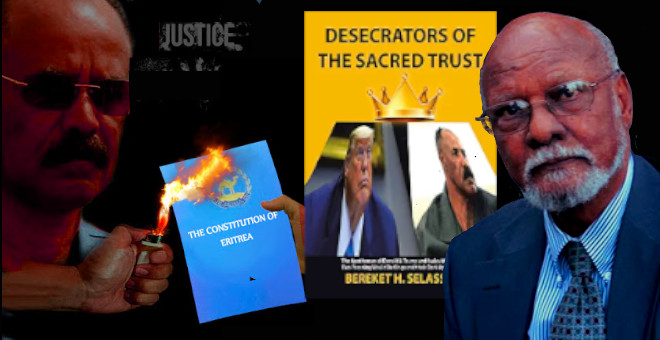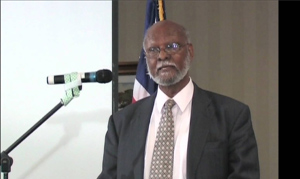A Book Review of “Desecrators of the Sacred Trust”

Review by Semere T Habtemariam
Title: Desecrators of the Sacred Trust: The Apotheoses of Donald J. Trump and Isaias Afwerki, Two Preening Would Be Kings and their Dark Agendas.
Author: Bereket Habte Selassie
Publisher: authorhouse
Year: 2020, Pages: 183
In Desecrators of the Sacred Trust, Dr. Bereket Habte Selassie has the audacity to compare an elephant with an ant and a giant with a dwarf. This is not a Gulliver making a farcical comparison between Lilliput and Brobdingnag. Dr. Bereket makes a literal comparison of Donald J. Trump, the president of the United States, with Isaias Afwerki, the dictator of Eritrea. The former is allegedly guilty of an attempted murder of an American democracy; while the latter is guilty of an attempted last-trimester-abortion of the Eritrean constitution.
Many people, among whom the most visible is the Eritrean dictator himself, either deny the ownership of the constitution or assert that it was still-born and not worthy of a proper burial. It is not clear if Dr. Bereket is trying to give Isaias a paternity test or look for foster-parents, who could adopt his ratified and promulgated constitution, but one has to admire his tireless advocacy for its implementation. As small as this book is, the 1997 Eritrean Constitution is included in its Preamble section. In a twisted irony and in a language that is sort of giving the middle finger, Isaias has made it abundantly clear that he has cleaned his bottom with the bottom-up constitution that was supposed to be an Eritrean innovation in the world of constitutional-making.
What is the statute of limitations, anyway?
After 22 years of irrelevance, isn’t giving up tantamount to growing up? What is the point of wilderness if it does not cut off people from the past and lead them into a fresh start? One of the best ways to come to terms with the present, chart a new path into the future, is to put the past to rest. It is time to jettison all the old baggage and keep the vehicle of democratic change light and nimble.
Eritreans’ moral and political commitment should be to constitutional rule, a product of an inherently political process, and the 1997 constitution-making was everything but political. How could it be political when all political organizations, except the ruling party, were systematically excluded? How could people express their dissenting opinions and different national visions when they are systematically instructed to toe the ruling party’s line and without leaning on each others’ support and the power-of-solidarity derived from affiliating with political groups?
As James Madison in Federalist 9 would say, “liberty is to faction what air is to fire.” Afraid that it might catch fire, the constitution-making process was denied the very oxygen it needed to live and thrive.
No constitution-making could be taken as a serious undertaking if it failed to accommodate various factions to participate in an inclusive, open, and fair process. Those individuals, former ELF veterans and its splinters, who participated in the process as individuals, and not representing their respective organizations, were like neutered dogs; they barked, played and wiggled their tails, but did not produce offspring.
I was once a member of the choir who sang the “Implement the ratified Constitution” hymn, but “I was once blind, now I see.”
My writings and activism might have contributed to the confusion and disarray among the change-seeking-camp, and I apologize for that. I was wrong. My honesty is a testimony to my evolution and my way of making it right. If I am not honest with my own truth, then, I don’t see the reason for writing. Thinking is the way I wrestle with the truth and writing is the way I take ownership of it. It is an atonement of an old truth and the confession of a new one.
Now this truth is new to me, but it is an old and familiar truth to many of my compatriots who were our canaries in the coal mine. From them I get my inspiration, and to them I owe a debt of gratitude, and from this day forward, I hope they embrace me, at least, as an ally, if not one of them.
As long as people are continuously learning and evolving, they shall inherit the paradise of enlightenment. It is the prerequisite to action. Learning should lead to knowledge and knowledge to understanding and understanding to action. Action is the ultimate goal but as the old adage shows, “mission without vision is a nightmare.” A society that places zero premium on education and learning is bound to perish.
The worst thing we can do is fail to be rational and succumb to rationalization.
Cost benefit analysis might be right and necessary in the realm of business and economics, but it should not have a dominant place in morality. My opposition to tyranny was and still is strictly moral; and to ensure its success I have to embark on politics and activism. Although we have to be very grounded in reality, if we are to be effective and remain relevant, our demands and goals must be infinite. All religions and successful mass movements know this: it is not the plan that matters but the dream.
One of the most pernicious effects of tyranny is that it blunts peoples’ ability to dream and envision a better future and a world of infinite possibilities. I believe this is what Joe Biden meant when he said, “if I have to describe America in one word, it is possibilities.”
Books loom large in my life; it is how I wrestle with the truth like Jacob did with the angel. The more I read, the more I discover that it is the small piece-meal margins that make the greatest impact in my intellectual growth. I like books that add to my fund of knowledge, understanding and provide me some moral edification. It is rare that I come across books that I don’t learn from and Dr. Bereket’s new book is no exception. That being said, I have to confess that I have struggled big time to make sense of this book. I read it twice (the ebook and paperback) and, although, many nuggets of wisdom adorn its pages, the familiarity of the subject bred contempt in me. I was hoping to see the prosecutorial skills of a highly trained lawyer and the analytical skills of a political scientist, but I am afraid it came a bit short. It read more like a work of a reporter that is rich in details and short on insights.
Dr. Bereket has written about 20 books and several articles and I have read most of his books but this new one is my least favorite. Its virtue lies in the fact that the writing is snappy, fluid; and it flows like silk. It is often said that “writing a book is like writing a letter and one must have a keen sense of who is being addressed.” I am not sure who the target audiences of this book are. If the Eritrean youth and adults who don’t follow current events and read habitually are the target audience, I can see how this book would be a nice introduction or refresher into some basic concepts on the philosophy of the rule of law, constitution, democracy, a republic form of government, and how to avoid the pitfalls of allowing tyrants to rule.
The title of Dr. Bereket’s book is provocative, and at first glance, it whetted my appetite. I started flipping the pages with zest; I was curious to know what I would reap of what I sow. And like most people, I have to raise the most obvious question: Who among the sane, would put on the same pedestal a petty dictator of a poor country with the president of the most powerful nation on earth, even if it is for comparison purposes?
Isn’t this giving inadvertently an undeserved compliment to the petty dictator, who has failed to outgrow his small town hustling of the good old days of Asmera, and the radicalism of a young guerilla freedom fighter of Sahel? Isaias’ behaviour could be the self-imposed case of an arrested development or the classic case of a man who suffers from Peter Pan syndrome.
Dr. Bereket does not seem to be a bit concerned if the answer to this question is in the affirmative because the overall, overriding and transcendental goal of the book is to provide an edifying lesson that people should not be confused with yahoos.
Indeed both Trump and Isaias are yahoos.
An understanding of human psychology seems to be the answer to stopping unhinged men: “preening would be kings and their dark agendas.” Towards this, Dr. Bereket offers a technique that is adequately iterative, but not intellectually satisfying. After all is done and said, it turns out that the old adage of “eternal vigilance” is the only antidote to tyranny. The psychological mechanisms in sociopathy are far from being airtight.
History offers us a glut of tyrants who, in their respective time, exercised unbridled power and the question of what could have been done to stanch their rise to unfettered power has been at the forefront of political thinking. The psychological approach is just an old wine in a new bottle and it seems to address the symptom and not the cause of tyranny.
It is only with the modern institutionalization of inclusive political and economic institutions that societies have been able to hem in the-would-be-dictators. Even democratic institutions are not immune to the threat of demagoguery and populism as evidenced by the election of Donald J Trump.
The election of Joe Biden is a political victory and not a moral one, for it failed to denounce unequivocally the conditions that made the election of Donald Trump possible in the first place. The glaring fact is that about 70 million Americans have voted for him in his failed reelection campaign and “the soul of America” has yet to be healed.
Dr. Bereket is fully aware that “the two preening would be kings,” could not be much more different from each other in terms of power and prestige and yet they are so similar to each other in their predilection to act above the law. It looks that there is a human nature template where some would-be-tyrants could be pigeonholed, and the recognition of this could help us avoid tyranny.
Even if we are to believe this is true, it does not tell us when the traits of sociopathy could be identified and when a preemptive intervention could be necessary.
At one point did Isaias Afwerki morph from being a popular and admired revolutionary leader into a despised and hated dictator? Dr. Bereket does not offer any explanation, but, at the same time, he neither fails to acknowledge isaias’ commendable leadership during the struggle era nor condemn his total grip of power after independence.
Isaias led the Eritrean struggle to victory and for that he was universally praised.
To the contrary of demonizing Isaias, Dr. Bereket seems to give him almost superhuman qualities. Isaias was the self-made black swan among the galaxy of EPLF leadership, with unparalleled determination, cleverness and cunning, who used Machivellian tactics to bamboozle and hoodwink the EPLF to establish the secret party, which catapulted him to be the alpha and omega of the organization, and subsequently the country.
The making of Trump is a bit different. Trump did not create the politics of hate, division, nationalism, protectionism, and isolationism. These were the preexisting conditions that made his election possible and people who scored higher on the authoritarian scale were more likely to vote for Trump than Clinton in the 2016 election. In the last few decades, Americans have steadily increased their score in the authoritarian scale, where some keen observers were setting the alarm bells ringing about the inevitable rise of an authoritarian leader in America before the presidential candidacy of Trump was in the offing.
In a system where leaders are supposed to reflect the views of their constituencies, leading from behind and not from the front, the law of average tilts heavily to mediocrity, thus, confirming the old adage that people get what they deserve.
Whether it is Isaias or Trump, there is no dictator who can stay in power without the support of his loyal supporters. Quite often, it is not the dictator himself who pulls the triggers, misinforms, disinforms, intimidates or imprisons people; it is his loyal dogs.
There was nothing in the EPLF, and later PFDJ’s, structure designed to hemm in the rise of tyranny. The bitter truth is that some of the members of the G-15, that Dr. Bereket generously labelled heroes, were reshuffled from one ministry to another like lap dogs by Isaias Afweriki, without any confirmation process by any branch of government.
Dr. Bereket himself was single-handedly appointed by Isaias to head the Constitutional Commission without any confirmation process. If a highly trained lawyer, a former attorney general, a judge and a law professor could not insist on some adherence to some basic and well-established protocols of normal governance, then, why are we surprised by the fact that Isaias acts like he is the law.
Sometimes it is also hard to distinguish between genius and mental illness. Studies have shown that people who suffer from schizophrenia and bipolar disorders are extremely creative and intelligent. As long as people can function within the established norms, they should not be excluded from pursuing their interests. The focus should be on how we can strengthen institutions where the rule of law is strictly followed, the in-built governmental mechanism of check and balance, and separation of powers are allowed to promote transparency and accountability, and the love of freedom and the the love of truth circulates in the societies like blood circulates in the body.
Dr. Bereket’s new book, Desecrators of the Sacred Trust, can be purchased at Amazon by clicking on this link: Desecrators of the Sacred Trust
——————
Semere Tesfamicael Habtemariam is the author of Reflections on the History of the Tewahdo Orthodox Church History of Tewahdo Church and Hearts Like Birds Hearts like Birds. He can be reached at his email: weriz@yahoo.com




Awate Forum